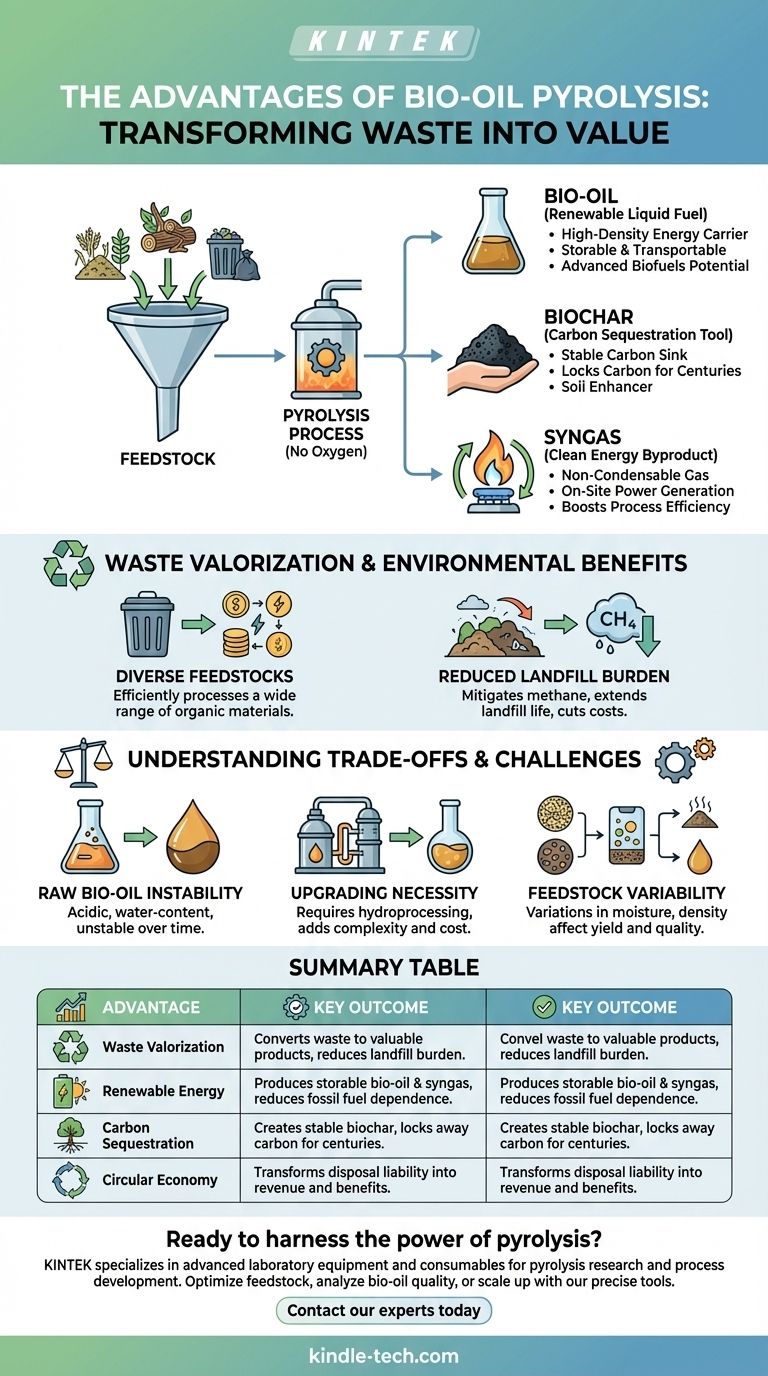At its core, bio-oil pyrolysis presents a compelling set of advantages by transforming low-value biomass and waste into valuable products. The primary benefits are the ability to process a wide range of organic materials, the creation of renewable energy carriers like bio-oil and syngas, and the production of biochar, which serves as a highly effective method for carbon sequestration.
Pyrolysis is more than just an energy production method; it is a waste valorization strategy. It unlocks the potential to create a circular system where organic waste is converted into renewable fuels and a stable carbon sink, directly addressing both energy independence and climate change mitigation.

A Solution for Waste Valorization
One of the most significant advantages of pyrolysis is its ability to reframe "waste" as a valuable resource, often called a feedstock.
Processing Diverse Feedstocks
Pyrolysis technology is remarkably flexible. It can efficiently process a wide array of organic materials, including agricultural residues, wood waste, and even certain components of municipal solid waste.
This versatility allows communities and industries to turn local waste streams, which are often a disposal liability, into a source of revenue and energy.
Reducing Landfill Burden
By diverting organic waste from landfills, pyrolysis directly mitigates the production of methane, a potent greenhouse gas generated by anaerobic decomposition.
This not only reduces environmental impact but also extends the lifespan of existing landfills and reduces the costs associated with waste management.
Generating Valuable and Renewable Products
The pyrolysis process breaks down biomass in the absence of oxygen, yielding three primary products, each with distinct environmental and economic benefits.
Bio-oil: A Renewable Liquid Fuel
The main liquid product, bio-oil, is a high-density energy carrier. Unlike solid biomass, this liquid can be more easily stored and transported for use in boilers, furnaces, or upgraded into advanced biofuels.
This creates a pathway to replace fossil fuels in heating and power generation, reducing dependence on finite resources and their associated price volatility.
Biochar: A Powerful Carbon Sequestration Tool
The solid co-product, biochar, is a stable, carbon-rich material similar to charcoal. When added to soil, it resists decomposition for hundreds or even thousands of years.
This process effectively locks atmospheric carbon, captured by the original biomass, into a solid form. This makes biochar a powerful tool for carbon sequestration and a potential asset in global carbon markets.
Syngas: A Clean Energy Byproduct
The process also yields a non-condensable gas known as syngas. This gas can be captured and combusted on-site to provide the heat required to sustain the pyrolysis reaction, making the entire system more energy-efficient and self-sufficient.
Understanding the Trade-offs and Challenges
While the advantages are clear, it is critical to understand the technical realities of the technology to implement it successfully. The primary challenges revolve around the quality and handling of the raw bio-oil.
The Instability of Raw Bio-oil
Raw, or "crude," bio-oil is not a direct replacement for conventional fuels like diesel or heating oil. It is typically acidic, contains a significant amount of water, and can be chemically unstable over time.
These properties make it corrosive to standard pipes and engines and can cause it to thicken or polymerize during storage.
The Need for Upgrading
To be compatible with existing infrastructure and engines, bio-oil must undergo upgrading. This involves processes like hydroprocessing to remove oxygen and stabilize the molecules.
Upgrading adds complexity and cost to the overall process, a crucial factor to consider in economic models for a pyrolysis plant. It is analogous to how crude petroleum must be refined before it can be used as gasoline.
Feedstock Variability
While feedstock flexibility is an advantage, it is also a challenge. Variations in the moisture content, density, and chemical composition of the input material can affect the yield and quality of the final products.
Achieving a consistent output requires careful management and pre-treatment of the incoming feedstock, adding an operational layer to the process.
Making the Right Choice for Your Goal
The "best" advantage of pyrolysis depends entirely on your primary objective.
- If your primary focus is waste management: The key benefit is the ability to drastically reduce waste volume while converting a disposal liability into valuable assets.
- If your primary focus is renewable energy production: The value lies in creating a storable liquid fuel (bio-oil) and a self-sustaining energy loop with syngas, though you must account for upgrading costs.
- If your primary focus is carbon reduction: The standout advantage is the production of biochar, one of the most robust and long-term methods for terrestrial carbon sequestration.
Ultimately, bio-oil pyrolysis offers a powerful and multifaceted tool for building a more sustainable and circular economy.
Summary Table:
| Advantage | Key Outcome |
|---|---|
| Waste Valorization | Converts diverse biomass & waste into valuable products, reducing landfill burden. |
| Renewable Energy | Produces storable bio-oil and syngas, reducing dependence on fossil fuels. |
| Carbon Sequestration | Creates stable biochar that locks away carbon in soil for centuries. |
| Circular Economy | Transforms a disposal liability into a source of revenue and environmental benefits. |
Ready to harness the power of pyrolysis for your biomass or waste streams?
KINTEK specializes in advanced laboratory equipment and consumables for pyrolysis research and process development. Whether you are optimizing feedstock, analyzing bio-oil quality, or scaling up production, our precise and reliable tools are designed to support your goals in renewable energy and carbon sequestration.
Contact our experts today to discuss how KINTEK's solutions can help you build a more sustainable and profitable operation.
Visual Guide

Related Products
- Electric Rotary Kiln Small Rotary Furnace Biomass Pyrolysis Plant
- Laboratory Rapid Thermal Processing (RTP) Quartz Tube Furnace
- Laboratory Test Sieves and Sieving Machines
- Graphite Vacuum Furnace IGBT Experimental Graphitization Furnace
- Vacuum Heat Treat and Molybdenum Wire Sintering Furnace for Vacuum Sintering
People Also Ask
- What are the advantages of pyrolysis technology? Turn Waste into Profit and Reduce Emissions
- What are the different types of pyrolysis machines? Choose the Right System for Your Output
- What is a disadvantage of biomass energy? The Hidden Environmental and Economic Costs
- What are the components of biomass pyrolysis? A Complete Guide to the System, Products, and Process
- How is energy converted into biomass? Harnessing Nature's Solar Power for Renewable Energy



















